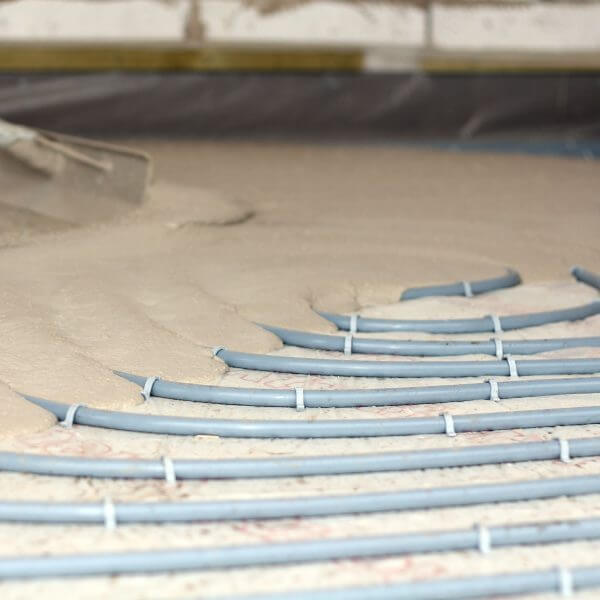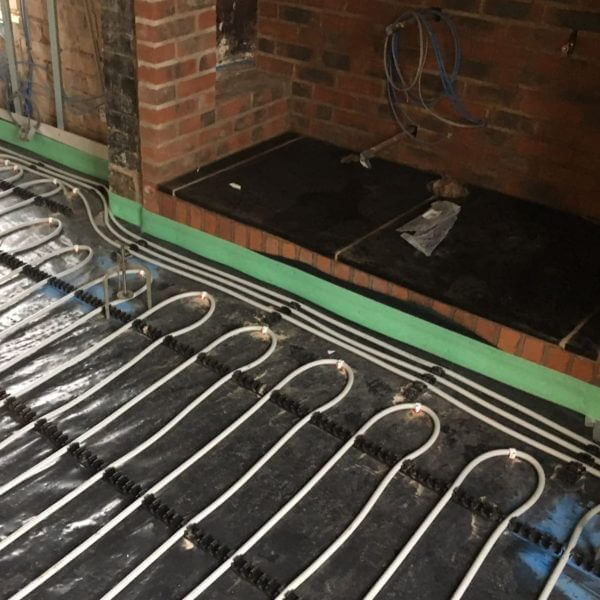Which is Better, Electric or Wet Underfloor Heating in 2025?
There are two types of floor-based heating, wet underfloor heating and electric underfloor heating. Since their inception, there have been many debates over which is best and showcases the benefits of underfloor heating most.
We here at EasyFlow touched on this topic before, but there have been new developments in building technology since then, such as the increase in heat pump installations. We felt it was time to update our insight and help you decide which system to get in 2025.
| Factor | Wet Underfloor Heating | Electric Underfloor Heating |
|---|---|---|
| How underfloor heating works | A heat source and manifold distribute heated water across a network of pipes | A series of encased wires heat up, radiating heat across a floor. |
| How hot it runs | The boiler flow temperature operates around 40°C. | Operates around 60-70°C, depending on wattage. |
| Installation cost | More expensive than electric underfloor heating | Less expensive than wet underfloor heating |
| Longevity | Lasts up to 50 years | Lasts up to 30 years |
| Floor height | Minimal to significant floor height increase | Minimal floor height increase |
| Running Costs | Cheaper than electric (both via gas & heat pumps) | More expensive due to tariff prices |
| Efficiency | Highly efficient | Efficient on a small scale |
| Heat Pump Compatibility | Compatible | Not compatible |
| Radiator Compatibility | Can be connected to an existing radiator system | Works independently to radiators. May need separate thermostat. |
| Ease of Installation | More complex to install, depending on the property | Easy to install but prone to design complications |
| Renewable Energy Compatibility | Compatible with home energy generation when using renewable heat sources like heat pumps or solar-thermal | Compatible with home energy generation (e.g. solar panels & wind turbine) |
| Potential Complications | Leaks, hot/cold spots. | Hot spots, fire hazards, breaker trips |
| Best for | Full heating refurbishments, homes with heat pumps, and underfloor heating for large rooms. | Underfloor heating for bathrooms or small extensions |
So Which is Best?
Though a universal answer is preferable, the reality is it depends on your own circumstances. What heat source you currently use, the size of your rooms, and what you want to do with your property will all contribute towards your final decision. Below, we documented several factors and circumstances to help inform your decision.
Harnessing Renewable Energy
Looking to go gas-free and reduce your carbon footprint? Electric-based heating can take advantage of renewable energy generated in your home, such as from a solar panel or wind turbine. But that doesn’t mean that wet underfloor heating doesn’t benefit you either, it can work with a number of renewable heat sources such as a heat pump.
Considering gas boilers are being phased out and heat pump installations are ever-increasing, water-based floor heating would benefit you most if you are looking to move away from reliance on gas. You are still going to require a heat source for hot water usage in the home, after all.
Heating an Extension/Small Area
If you have added an extension or want underfloor heating for a bathroom on its own, then electric underfloor heating would be more suitable. This type of heating works best in small-scale applications and saves time and money from adding another radiator to your network.
That said, if your extension is particularly large, a water-based underfloor heating may be more preferable. This setup can work parallel to your current radiator based heating system, meaning you do not need to do a full refurbishment to accommodate it.
What Should You Replace Radiators With?
If you are getting rid of your radiators completely, and replacing it with underfloor heating, then wet underfloor heating is highly recommended. As mentioned before, electric-based works best in small-scale applications. When heating a whole house, electric-based starts to lose the primary benefits of underfloor heating. Being more expensive to run, it can quickly rack up costs compared to water-based heating at the same scale.
As for water-based heating, it would likely be compatible with your current heat source and provide the full benefits of underfloor heating on a large scale. Especially if you switch out your gas boiler for a heat pump installation.
Why Choose EasyFlow for Wet Underfloor Heating?
We have been installing underfloor heating for bathrooms, extensions, and full refurbishments for decades, and many construction companies choose us time and time again for our build quality. Our expertise in design and build quality give you the full benefits of underfloor heating whilst minimising the risk of leaks, thanks to our continuous loop design.
Give us a call or email and see how we can help with your building project today! Use the contact form below and a member of our team will be in touch to discuss your requirements.




Where To Find Us